[2011] 46 VST 1 (Bom) - RS Goyal & Associates
[2011] 46 VST 1 (Bom) - RS Goyal & Associates
[2011] 46 VST 1 (Bom) - RS Goyal & Associates
You also want an ePaper? Increase the reach of your titles
YUMPU automatically turns print PDFs into web optimized ePapers that Google loves.
VATLaws (Readable Version) - Thursday, January 10, 2013<br />
[<strong>2011</strong>] <strong>46</strong> <strong>VST</strong> 1 (<strong>Bom</strong>)<br />
[IN THE BOMBAY HIGH COURT]<br />
Additional Commissioner of Sales Tax, VAT III, Mumbai<br />
V.<br />
Ankit International<br />
DR. CHANDRACHUD D.Y. AND SAYED A.A. JJ.<br />
September 15 <strong>2011</strong><br />
HF ♦ Assessee, including dealer (Registered or Unregistered)<br />
VALUE ADDED TAX—PENALTY—FAILURE TO FURNISH AUDIT REPORT WITHIN PRESCRIBED<br />
PERIOD—COMMISSIONER—DISCRETION CONFERRED TO IMPOSE PENALTY EXTENDS ALSO TO<br />
QUANTUM OF PENALTY TO BE IMPOSED—MAHARASHTRA VALUE ADDED TAX ACT, 2002 (9 OF 2005),<br />
S. 61(2).<br />
CONSTRUCTION OF TAXING STATUTES—CONSTRUCTION THAT FAVOU<strong>RS</strong> ASSESSEE TO BE<br />
PREFERRED.<br />
A penalty under section 61(2) of the Maharashtra Value Added Tax Act, 2002, was levied on the<br />
respondent-assessee for furnishing the audit report for the period from April 1, 2006 to March 31, 2007 beyond<br />
the period prescribed and that order was confirmed in appeal by the Joint Commissioner. The Tribunal in<br />
second appeal reduced the penalty holding that the delay on the part of the respondent was not deliberate. On<br />
an appeal contending that once the Commissioner came to the conclusion that a penalty was imposable he<br />
had no further discretion in regard to the extent of the penalty:<br />
Held, that the State Legislature had in section 61(2) of the Maharashtra Value Added Tax Act, 2002, clearly<br />
conferred a discretion on the Commissioner to impose a penalty. That being the position mere use of the words<br />
“equal to one tenth per cent of the total sale” could not lead to the conclusion that there was no discretion in<br />
regard to the quantum of the penalty and that a penalty only in an amount equal to one tenth per cent of the<br />
total sales could be imposed. The Legislature having used the word “may”, a clear provision was required if the<br />
Act intended to oust the discretion on the quantum, which was not the case. The proviso to sub-section (2) was<br />
an exception and did not control the substantive part of section 61(2). The substantive part of sub-section (2) of<br />
section 61 conferring a discretion upon the Commissioner was not diluted by the proviso to sub-section (2).<br />
Therefore the order by the Tribunal did not warrant any interference.<br />
Hindustan Steel Ltd. v. State of Orissa [1970] 25 STC 211 (SC) and State of Madhya Pradesh v. Bharat Heavy<br />
Electricals [1997] 106 STC 604 (SC) applied.<br />
If two views in regard to the interpretation of a provision are possible, the court would be justified in adopting<br />
that construction which favours the assessee.<br />
Commissioner of Income-tax v. Vegetable Products Ltd. [1973] 88 ITR 192 (SC) and Mauri Yeast India Pvt.<br />
Ltd. v. State of U. P. [2008] 14 <strong>VST</strong> 259 (SC) followed<br />
Sales Tax Appeal No. 9 of <strong>2011</strong> decided on September 15 <strong>2011</strong><br />
Ms. Uma Palsuledesai, AGP, for the appellant<br />
C.B. Thakar for the respondent<br />
This copy was printed from VATLaws licensed to: R.S. <strong>Goyal</strong>
VATLaws (Readable Version) - Thursday, January 10, 2013<br />
Cases referred to :<br />
Hindustan Steel Ltd. v. State of Orissa [1970] 25 STC 211 (SC) applied<br />
State of Madhya Pradesh v. Bharat Heavy Electricals` [1997] 106 STC 604 (SC) applied<br />
Commissioner of Income-tax v. Vegetable Products Ltd. [1973] 88 ITR 192 (SC) followed<br />
Mauri Yeast India Pvt. Ltd. v. State of U.P. [2008] 14 <strong>VST</strong> 259 (SC) followed<br />
Carpenter Classic Exim P. Ltd. v. Commissioner of Customs (Imports) [2010] 2 GSTR 443 (SC)<br />
referred<br />
Commissioner of Central Excise v. Sunil Silk Mills [<strong>2011</strong>] 267 ELT 438 (SC) referred<br />
Commissioner of Income-tax v. Vegetable Products Ltd. [1973] 88 ITR 192 (SC) referred<br />
Hindustan Steel Ltd. v. State of Orissa [1970] 25 STC 211 (SC) referred<br />
Mauri Yeast India Pvt. Ltd. v. State of U.P. [2008] 14 <strong>VST</strong> 259 (SC) referred<br />
Nitco Paints Ltd. v. State of Maharashtra [<strong>2011</strong>] 42 <strong>VST</strong> 71 (<strong>Bom</strong>) referred<br />
State of Madhya Pradesh v. Bharat Heavy Electricals [1997] 106 STC 604 (SC) referred<br />
State of Rajasthan v. D.P. Metals [2001] 124 STC 611 (SC) referred<br />
Union of India v. Dharamendra Textile Processors [2008] 306 ITR 277 (SC) [2008] 18 <strong>VST</strong> 180 (SC)<br />
referred<br />
Union of India v. Krishna Processors [2010] 2 GSTR 521 (SC) referred<br />
Union of India v. Rajasthan Spinning & Weaving Mills [2010] 1 GSTR 66 (SC) referred<br />
The judgment of the court was delivered by<br />
--------------------------------------------------<br />
JUDGMENT 1<br />
DR. D.Y. CHANDRACHUD J.—This appeal filed by the Revenue raises a question as regards the<br />
interpretation of the provisions of section 61(2) of<br />
the Maharashtra Value Added Tax Act, 2002 ("the MVAT Act"). The Commissioner<br />
of Sales Tax is in appeal against a decision of the Maharashtra<br />
Sales Tax Tribunal dated October 5, 2010, by which the Tribunal in an<br />
appeal filed by the assessee reduced the penalty imposed for the belated<br />
filing of an audit report for the year 2006-07 to Rs. 25,000. The submission<br />
of the Revenue is that under section 61(2) while there is a discretion vested<br />
in the Commissioner whether or not to impose a penalty, once the<br />
Commissioner decides to impose a penalty it has to be in an amount equal<br />
to one tenth per cent of the total sales of the assessment year. In other<br />
words, the contention of the State is that while there is a discretion on<br />
whether or not a penalty should be imposed in the first place, no discretion<br />
is conferred by section 61(2) to reduce the amount of penalty, once the<br />
Commissioner comes to the conclusion that a penalty is liable to be<br />
imposed.<br />
We admit the appeal on the following substantial questions of law (as<br />
recast by the court to bring out the nature of the controversy in the appeal):<br />
"(i) Does section 61(2) of the MVAT Act confer a discretion on<br />
whether or not a penalty should be imposed as well as on the<br />
quantum of penalty?<br />
(ii) In the event that the Commissioner holds that a penalty has to<br />
be imposed under section 61(2) upon the failure of a dealer to furnish<br />
an audit report within the prescribed period, does the Commissioner<br />
have the discretion to impose a penalty less than one tenth per cent<br />
This copy was printed from VATLaws licensed to: R.S. <strong>Goyal</strong>
VATLaws (Readable Version) - Thursday, January 10, 2013<br />
of the total sales?<br />
(iii) Is the reduction in the quantum of penalty from Rs. 83,013 to<br />
Rs. 25,000 justified in the facts and circumstances of the case?"<br />
The respondent is a registered dealer under the provisions of the MVAT<br />
Act, 2002. The respondent filed an audit report under section 61 in the<br />
1 Oral.<br />
Page No: 3<br />
prescribed form (form No. 704) for the period April 1, 2006 and March 31,<br />
2007 beyond the period prescribed. The Deputy Commissioner of Sales<br />
Tax (25), Business Audit Unit 4, Mumbai, issued a notice to show cause to the<br />
respondent as to why a penalty should not be imposed under section 61(2)<br />
for a delay in filing the audit report. By an order dated August 31, 2009, the<br />
Deputy Commissioner of Sales Tax imposed a penalty of Rs. 83,013. This<br />
order was confirmed in appeal by the Joint Commissioner of Sales Tax on<br />
May 17, 2010. The Tribunal in second appeal reduced the penalty by its<br />
impugned order dated October 5, 2010 to Rs. 25,000 holding that the delay<br />
on the part of the respondent was not deliberate. The Tribunal accepted<br />
the explanation of the respondent that the person who had conducted the<br />
audit for 2005-06 took up employment elsewhere and when this fact had<br />
come to the knowledge of the respondent, a business audit for 2006-07<br />
was conducted and an audit report was filed, though belatedly. The<br />
Tribunal held that the delay was not deliberate. In the circumstances, the<br />
penalty was remitted to the extent of 30 per cent. The total penalty levied<br />
was in the amount of Rs. 25,000.<br />
In support of the appeal, counsel appearing on behalf of the appellant<br />
submits that (i) under section 61(2) the Commissioner has a discretion<br />
whether or not to impose a penalty in the first place but once he comes to<br />
conclusion that a penalty is liable to be imposed, he has no further<br />
discretion in regard to the extent of the penalty; (ii) the words used in the<br />
provision are "equal to" one tenth per cent of the total sales; (iii) the<br />
penalty must be equal to an amount representing one tenth per cent of the<br />
total sales and not any amount lower; and (iv) the decision of the Supreme<br />
Court in Union of India v. Dharamendra Textile Processors [2008] 18 <strong>VST</strong><br />
180 (SC); [2008] 306 ITR 277 (SC); [2008] 231 ELT 3 (SC) would advance<br />
this proposition.<br />
On the other hand, counsel appearing on behalf of the assessee<br />
submitted that (i) the Legislature has conferred a discretion upon the<br />
Commissioner, whether or not to impose a penalty and the discretion also<br />
extends to the quantum of penalty to be imposed; (ii) the decision of the<br />
Supreme Court in Dharamendra Textile [2008] 18 <strong>VST</strong> 180 (SC); [2008]<br />
306 ITR 277 (SC); [2008] 231 ELT 3 (SC) turned on the provisions of section<br />
11AC of the Central Excise Act, 1944 in which the levy of the penalty is<br />
mandatory and hence the decision has no application to the provisions of<br />
section 61(2) of the MVAT Act, 2002 in which the imposition of a penalty is<br />
not mandatory, but discretionary; (iii) in the event that two constructions<br />
are possible a construction which favours the assessee should be adopted;<br />
(iv) the Tribunal has consistently taken the same position which has not<br />
Page No: 4<br />
This copy was printed from VATLaws licensed to: R.S. <strong>Goyal</strong>
VATLaws (Readable Version) - Thursday, January 10, 2013<br />
been challenged by the Revenue; (v) unless a discretion were to be<br />
construed to have been granted to the Commissioner by section 61(2) both<br />
in regard to the imposition of a penalty and in regard to the extent of the<br />
penalty the provisions would be confiscatory; and (vi) the Commissioner<br />
has passed orders imposing arbitrary penalties as high as Rs. 52.92 lakh in<br />
one case, upon which reliance was placed.<br />
The rival submissions now fall for determination.<br />
Section 61 provides for the audit of accounts in certain cases. In clause (1)<br />
of section 61 (as it stood at the material time), every dealer liable to pay tax,<br />
if his turnover of sales or as the case may be, of purchases exceeds rupees<br />
forty lakh in any year, is required to get his accounts in respect of such year<br />
audited by an accountant within the prescribed period from the end of that<br />
year and furnish within that period the report of such audit in the<br />
prescribed form duly signed and verified by such accountant and setting<br />
forth such particulars and certificates as may be prescribed. Sub-section (2)<br />
of section 61 provides as follows:<br />
"(2) If any dealer liable to get his accounts audited under subsection<br />
(1) fails to furnish a copy of such report within the time as<br />
aforesaid, the Commissioner may, after giving the dealer a reasonable<br />
opportunity of being heard, impose on him, in addition to any tax<br />
payable, a sum by way of penalty equal to one tenth per cent of the<br />
total sales:<br />
Provided that, if the dealer fails to furnish a copy of such report<br />
within the period prescribed under sub-section (1), but files it within<br />
one month of the end of the said period, and the dealer proves to the<br />
satisfaction of the Commissioner that the delay was on account of<br />
factors beyond his control, then no penalty under this sub-section<br />
shall be imposed on him."<br />
Prior to its amendment by Maharashtra Act 25 in 2007, sub-section (2)<br />
of section 61 provided for a sum by way of penalty equal to one tenth per<br />
cent, of the total sales or as the case may be, purchases or a sum of one<br />
lakh rupees, whichever is less. Upon amendment, the words "or as the case<br />
may be, purchases or a sum of one lakh rupees, whichever is less" came to<br />
be deleted.<br />
The imposition of a penalty in sub-section (2) of section 61 is not<br />
mandatory. The Commissioner has been conferred with the discretion to<br />
determine as to whether a penalty should or should not be imposed, if a<br />
dealer who is liable to get his accounts audited under sub-section (1), fails<br />
to furnish a copy of the report within the time prescribed. The Legislature<br />
has provided that the Commissioner "may" impose a penalty after giving<br />
Page No: 5<br />
the dealer a reasonable opportunity of being heard. The use of the word<br />
"may" is clearly suggestive of the fact that imposition of a penalty is not<br />
mandatory. The legislative intent has been emphasized in the requirement<br />
of furnishing to the dealer a reasonable opportunity of being heard before a<br />
penalty is imposed. The fact that the Legislature contemplated an opportunity<br />
of being heard is indicative of the intent of the Legislature that the<br />
explanation which the dealer may have, has to be considered before the<br />
Commissioner determines as to whether penalty should be imposed. That<br />
the imposition of the penalty under sub-section (2) of section 61 is not<br />
This copy was printed from VATLaws licensed to: R.S. <strong>Goyal</strong>
VATLaws (Readable Version) - Thursday, January 10, 2013<br />
mandatory has been emphasized in a judgment of a Division Bench of this<br />
court in Nitco Paints Ltd. v. State of Maharashtra [<strong>2011</strong>] 42 <strong>VST</strong> 71 (<strong>Bom</strong>)<br />
in the following terms (para 3 at page 74 in 42 <strong>VST</strong>):<br />
". . . Section 61(2) clearly specifies that upon the failure of the<br />
dealer to get his accounts audited and to furnish a copy of the report<br />
within the time as prescribed, the Commissioner may after furnishing<br />
a reasonable opportunity of being heard, impose a penalty at the rate<br />
stipulated. The law provides that the penalty may be imposed and<br />
contemplates that a reasonable opportunity should be furnished to<br />
the dealer. Obviously there would be no occasion to furnish a<br />
reasonable opportunity of being heard if the liability to levy the<br />
penalty was automatic. Since the legislation has used the expression<br />
'may', the imposition of a penalty is discretionary. Undoubtedly such<br />
a discretion has to be exercised in accordance with law and<br />
judiciously. . ."<br />
But the submission which has been urged on behalf of the Revenue is<br />
that once the Commissioner proceeds to hold that a penalty is liable to be<br />
imposed, he must necessarily impose a penalty equal to one tenth per cent<br />
of the total sales. In other words, it is urged that the discretion is whether<br />
or not a penalty should be imposed and not in regard to the extent of the<br />
penalty. As a matter of first principle there is no reason for the court to<br />
restrict, by a process of construction the legislative intent in regard to the<br />
imposition of penalty by holding that the discretion would extend only to<br />
the imposition of a penalty and not with regard to the extent of the penalty.<br />
The Legislature is undoubtedly empowered in its plenary jurisdiction to<br />
determine whether a penalty is or is not mandatory. For instance the<br />
provisions in section 11AC of the Central Excise Act, 1944 came up for<br />
construction before the Supreme Court in the decision in Dharamendra<br />
Textile [2008] 18 <strong>VST</strong> 180 (SC); [2008] 306 ITR 277 (SC); [2008] 231 ELT 3<br />
(SC). Section 11 AC stipulated that where any duty of excise has not been<br />
levied or paid or has been short-levied or short-paid or erroneously<br />
Page No: 6<br />
refunded by reasons of fraud, collusion or any wilful mis-statement or<br />
suppression of facts, or contravention of any of the provisions of this Act or<br />
of the Rules made thereunder with intent to evade payment of duty, the<br />
person who is liable to pay duty as determined under sub-section (2) of<br />
section 11A, shall also be liable to pay a penalty equal to the duty so determined.<br />
In this background, the Supreme Court observed as follows (para 28<br />
at page 206 in 18 <strong>VST</strong>):<br />
"In Union budget of 1996-97, section 11AC of the Act was introduced.<br />
It has made the position clear that there is no scope for any<br />
discretion. In paragraph 136 of the Union budget reference has been<br />
made to the provision stating that the levy of penalty is a mandatory<br />
penalty. In the notes on clauses also the similar indication has been<br />
given."<br />
The words used in sub-section (2) of section 11A are "shall also be liable<br />
to pay a penalty equal to the duty so determined".<br />
The decision in Dharamendra Textile [2008] 18 <strong>VST</strong> 180 (SC); [2008]<br />
306 ITR 277 (SC); [2008] 231 ELT 3 (SC) was considered in a subsequent<br />
Division Bench in Union of India v. Rajasthan Spinning & Weaving Mills<br />
[2010] 1 GSTR 66 (SC); [2009] 238 ELT 3 (SC). The Supreme Court held as<br />
This copy was printed from VATLaws licensed to: R.S. <strong>Goyal</strong>
VATLaws (Readable Version) - Thursday, January 10, 2013<br />
follows (page 81 in 1 GSTR):<br />
"The decision in Dharamendra Textile [2008] 18 <strong>VST</strong> 180 (SC);<br />
[2008] 306 ITR 277 (SC); [2008] 231 ELT 3 (SC) must, therefore, be<br />
understood to mean that though the application of section 11AC<br />
would depend upon the existence or otherwise of the conditions<br />
expressly stated in the section, once the section is applicable in a case<br />
the concerned authority would have no discretion in quantifying the<br />
amount and penalty must be imposed equal to the duty determined<br />
under sub-section (2) of section 11 A. That is what Dharamendra<br />
Textile [2008] 18 <strong>VST</strong> 180 (SC); [2008] 306 ITR 277 (SC); [2008] 231<br />
ELT 3 (SC) decides."<br />
In the case of State of Rajasthan v. D.P. Metals [2001] 124 STC 611 (SC);<br />
AIR 2001 SC 3076, a three-Judge Bench of the Supreme Court interpreted<br />
section 78(5) of the Rajasthan Sales Tax Act, 1994 which read as follows<br />
(page 619 in 124 STC):<br />
"The incharge of the check-post or the officer empowered under<br />
sub-section (3), after having given the person in charge of the goods a<br />
reasonable opportunity of being heard and after having held such<br />
enquiry as he may deem fit, shall impose on him for possession or<br />
movement of goods, whether seized or not, in violation of the<br />
provisions of clause (a) of sub-section (2) or for submission of false or<br />
Page No: 7<br />
forged documents or declaration, a penalty equal to the amount of<br />
five times of the tax leviable on such goods or thirty per cent of the<br />
value of such goods. . ."<br />
There, the court laid emphasis on the use of the word "shall" to hold<br />
that (pages 635 and 636 in 124 STC):<br />
". . . This provision cannot be read as to imply that the penalty of<br />
30 per cent is the maximum and lesser penalty can be levied. The<br />
Legislature thought it fit to specify a fixed rate of penalty and not give<br />
any discretion in lowering the rate of penalty. The penalty so fixed is<br />
meant to be a deterrent and we do not see anything wrong in this 1 . . ."<br />
Thus, the Supreme Court has held that where the Legislature makes its<br />
intention clear through the use of the word "shall", the provision would be<br />
mandatory with regard to the quantum of penalty imposable. A similar<br />
ratio has recently laid down by a three-judge Bench of the Supreme Court<br />
in Commissioner of Central Excise v. Sunil Silk Mills [<strong>2011</strong>] 267 ELT 438<br />
(SC), where rule 96ZQ(5) of the Central Excise Rules, 1944 was being<br />
interpreted. The penalty involved there was similarly held to be mandatory<br />
due to the use of the word "shall." 2<br />
In the present case, the State Legislature has in section 61(2) clearly<br />
conferred a discretion on the Commissioner to impose a penalty. Once that<br />
is the position, the mere use of the words "equal to one tenth per cent of<br />
the total sale" cannot lead to the conclusion that there is no discretion in<br />
regard to the quantum of the penalty and that a penalty only in an amount<br />
equal to one tenth per cent of the total sales can be imposed.<br />
Some guidance in this regard can be obtained from the judgment of the<br />
This copy was printed from VATLaws licensed to: R.S. <strong>Goyal</strong>
VATLaws (Readable Version) - Thursday, January 10, 2013<br />
Supreme Court in State of Madhya Pradesh v. Bharat Heavy Electricals<br />
[1997] 106 STC 604 (SC); [1998] 99 ELT 33 (SC). Section 7 of the relevant<br />
Entry Tax Act in the State of Madhya Pradesh provided that every registered<br />
dealer who, in the course of his business, manufactures, produces or<br />
grows any goods specified in Schedule II in a local area in such a manner<br />
that the goods become local goods in relation to that local area, shall on<br />
the sale of such goods to any other registered dealer, issue to him a bill,<br />
invoice or cash memo specifically stating in such a manner as may be<br />
prescribed, that the goods being sold are local goods in relation to such<br />
local area and that no entry tax has been paid on such goods. Section 7(5)<br />
provided that where a registered dealer in the course of his business, sold<br />
1 Id. at 31<br />
2 See also Union of India v. Krishna Processors [2010] 2 GSTR 521 (SC); [2009] 15 SCC 58,<br />
Carpenter Classic Exim P. Ltd. v. Commissioner of Customs (Imports) [2010] 2 GSTR 443 (SC);<br />
[2009] 11 SCC 293.<br />
Page No: 8<br />
local goods to other registered dealers but failed to make the statement as<br />
referred in sub-section (1), it would be presumed that he has facilitated the<br />
evasion of entry tax on the local goods so sold and would be liable to pay a<br />
penalty equal to ten times the amount of entry tax payable on such goods<br />
as if they were not goods of local origin. The High Court had held that the<br />
presumption under section 7(5) was not rebuttable and that the penalty of<br />
ten times of the amount of tax, which could not be reduced, was confiscatory.<br />
In appeal before the Supreme Court the State of Madhya Pradesh<br />
made a statement through counsel that the State treated the provision for<br />
the levy of penalty equal to ten times of the amount of entry tax as a<br />
maximum penalty and not a fixed amount of penalty leaving no discretion<br />
for imposition of a lesser penalty. Undoubtedly, therefore, there was a<br />
concession before the Supreme Court by the State. Moreover, it was urged<br />
before the Supreme Court by the State that the presumption was rebuttable.<br />
After recording the submissions, the Supreme Court held as follows<br />
(page 609 in 106 STC):<br />
"From the aforesaid it follows that section 7(5) has to be construed<br />
to mean that the presumption contained therein is rebuttable and<br />
secondly the penalty of ten times the amount, of entry tax stipulated<br />
therein is only the maximum amount which could be levied and the<br />
assessing authority has the discretion to levy lesser amount depending<br />
upon the facts and circumstances of each case. Construing section 7(5)<br />
in this manner the decision of the High Court that section 7(5) is ultra<br />
vires cannot be sustained." (emphasis 1 supplied)<br />
Now, no doubt, in that case a statement was made before the Supreme<br />
Court by the State of Madhya Pradesh that the levy of a penalty equal to<br />
ten times the amount of entry tax was the maximum and was not a fixed<br />
penalty. Equally, it was observed in paragraph 13 which has been noted<br />
earlier, that the penalty of ten times the amount of entry tax was only a<br />
maximum and the assessing authority has the discretion to levy a lesser<br />
amount, depending on the facts of each case.<br />
The fundamental principle of law is that a penalty is not imposed merely<br />
because it is lawful to do so and that the authority has a discretion in that<br />
This copy was printed from VATLaws licensed to: R.S. <strong>Goyal</strong>
VATLaws (Readable Version) - Thursday, January 10, 2013<br />
regard. The authority has to determine whether a penalty should be<br />
imposed and if it decides to impose a penalty what is the extent of the<br />
penalty liable to be imposed. The Supreme Court held in its decision in<br />
Hindustan Steel Ltd. v. State of Orissa [1970] 25 STC 211 (SC) as follows<br />
(page 214 in 25 STC):<br />
1 Here italicised.<br />
Page No: 9<br />
". . . Penalty will not also be imposed merely because it is lawful to<br />
do so. Whether penalty should be imposed for failure to perform a<br />
statutory obligation is a matter of discretion of the authority to be<br />
exercised judicially and on a consideration of all the relevant circumstances.<br />
Even if a minimum penalty is prescribed, the authority<br />
competent to impose the penalty will be justified in refusing to<br />
impose penalty, when there is a technical or venial breach of the<br />
provisions of the Act or where the breach flows from a bona fide<br />
belief that the offender is not liable to act in the manner prescribed by<br />
the statute. . ."<br />
The Legislature may of course take away that discretion and make the<br />
imposition of a penalty mandatory for certain violations. Whether a penalty<br />
is mandatory is a matter of construing the legislative provision. Here the<br />
State Legislature by the use of the word "may" has not departed from the<br />
ordinary rule that a penalty is discretionary. The discretion must extend<br />
both to whether a penalty should be imposed and on the quantum. The<br />
Legislature having used the word "may", a clear provision was required, if<br />
the Act intended to oust the discretion on the quantum, in a case where<br />
the Commissioner is of the view that a penalty has to be imposed. That is<br />
not the case.<br />
Having therefore, considered the submission which has been urged on<br />
behalf of the appellant, we are of the view that there is no reason to accept<br />
the contention that the discretion which is conferred by section 61(2) does<br />
not extend also to the quantum of the penalty. Under the substantive part<br />
of sub-section (2) of section 61 the State Legislature has conferred a<br />
discretion on the Commissioner before he imposes a penalty on the dealer<br />
for failing to furnish a copy of the audited report within the prescribed<br />
period. The proviso to sub-section (2) states that if the dealer fails to<br />
furnish a copy of the said report within the prescribed period but files it<br />
within one month of the end of the period, and the dealer proves to the<br />
satisfaction of the Commissioner that the delay was on account of factors<br />
beyond his control, then no penalty under this sub-section shall be<br />
imposed upon him. Hence, in the circumstances set out that the proviso to<br />
sub-section (2), no penalty can be imposed at all if the conditions therein<br />
are fulfilled. The proviso operates when (i) the dealer fails to furnish a copy<br />
of the report within the prescribed period but files it within one month of<br />
the end of the period; (ii) the dealer proves to the satisfaction of the<br />
Commissioner that the delay was for reasons beyond his control. Where<br />
the proviso applies, no penalty can be imposed on the dealer at all.<br />
The proviso is an exception and does not control the substantive part of<br />
section 61(2). The substantive part of sub-section (2) of section 61 also<br />
confers a discretion upon the Commissioner which is not diluted by the<br />
This copy was printed from VATLaws licensed to: R.S. <strong>Goyal</strong><br />
Page No: 10
VATLaws (Readable Version) - Thursday, January 10, 2013<br />
proviso to sub-section (2).<br />
In any event, we are of the view that if two views in regard to the interpretation<br />
of section 61(2) are possible, the court would be justified in<br />
adopting that construction which favours the assessee. (see the decisions of<br />
the Supreme Court in Commissioner of Income-tax v. Vegetable Products<br />
Ltd. [1973] 88 ITR 192 (SC) and Mauri Yeast India Pvt. Ltd. v. State of<br />
U.P. [2008] 14 <strong>VST</strong> 259 (SC).<br />
On the facts of the case, the Sales Tax Tribunal has furnished adequate<br />
reasons for reducing the penalty from an amount of Rs. 83,013 to<br />
Rs. 25,000. The Tribunal has found that the delay on the part of the assessee<br />
was not deliberate. That finding does not warrant any interference.<br />
For these reasons, we answer the questions of law as formulated in the<br />
affirmative.<br />
The appeal is accordingly disposed of. There shall be no order as to costs.<br />
Page No: 11<br />
This copy was printed from VATLaws licensed to: R.S. <strong>Goyal</strong>


![[2011] 46 VST 1 (Bom) - RS Goyal & Associates](https://img.yumpu.com/38346436/1/500x640/2011-46-vst-1-bom-rs-goyal-amp-associates.jpg)
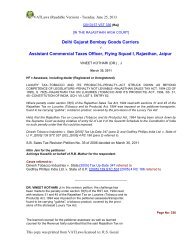
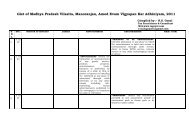
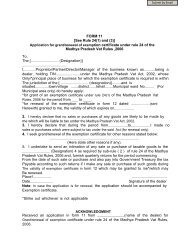
![levy of tax under vat 9b an stamp duty simultaneously[1] - RS Goyal ...](https://img.yumpu.com/45559052/1/158x260/levy-of-tax-under-vat-9b-an-stamp-duty-simultaneously1-rs-goyal-.jpg?quality=85)
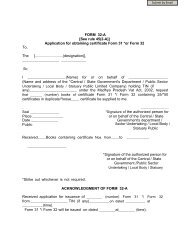
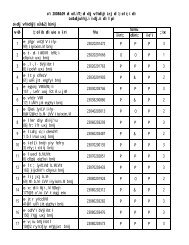
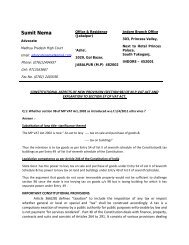
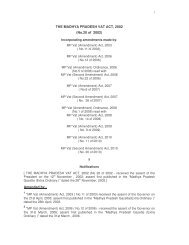
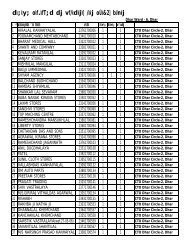
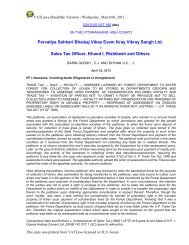
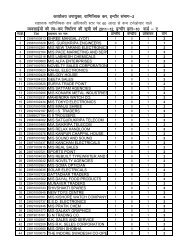
![[2012] 54 VST 26 (P and H) - RS Goyal & Associates](https://img.yumpu.com/38348208/1/190x245/2012-54-vst-26-p-and-h-rs-goyal-associates.jpg?quality=85)
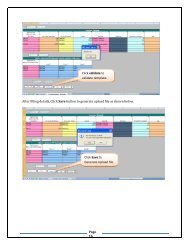
![[2012] 47 vst 116 (cestat) - RS Goyal & Associates](https://img.yumpu.com/38348091/1/190x245/2012-47-vst-116-cestat-rs-goyal-associates.jpg?quality=85)
![[2012] 47 VST 379 (Ker) - RS Goyal & Associates](https://img.yumpu.com/38348087/1/190x245/2012-47-vst-379-ker-rs-goyal-associates.jpg?quality=85)